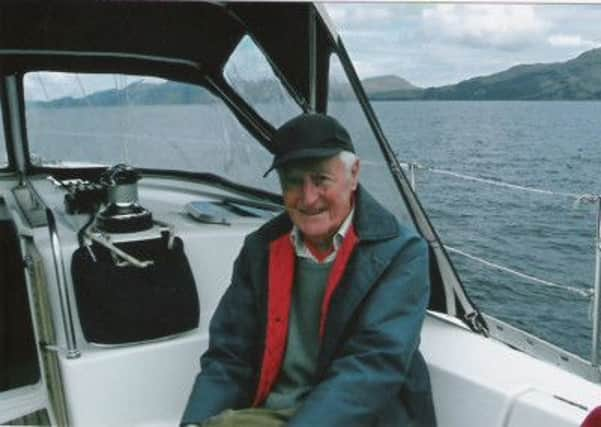Obituary: Vice-Admiral Sir Cameron Rusby KCB LVO, naval officer


Cameron Rusby was a 17-year-old Midshipman on the battleship HMS Howe when, itself facing attack by the Luftwaffe, it supported the Allied invasion of Italy in 1943. He went on to become the most senior Royal Navy officer in Scotland at HM Naval Base Clyde in the 1970s, in charge of the UK’s nuclear deterrent; and he ended his 40-year career as Nato (North Atlantic Treaty Organisation) deputy commander for the Atlantic region while the Cold War was still icy. But perhaps his own fondest memories were as Captain of the Royal Yacht Britannia for three years during the 1960s, when he “drove” the Queen more than 44,000 miles on official tours, including to Fiji, New Zealand and Australia.
To his friends and neighbours in Edinburgh, Melrose and around the Borders, though, he will probably be remembered simply as Cameron, animal lover and chief executive of the Scottish Society for the Prevention of Cruelty to Animals for ten years (when he was based in Edinburgh); or as the warden of the historic Neidpath Castle overlooking the river Tweed, owned by the Earl of Wemyss and said to be haunted by the ghost of Jean Douglas – Sir Walter Scott’s “Maid of Neidpath”; or as an elder at Melrose Parish Church; or as the beaming pensioner who could be seen driving not a royal yacht but Rosie (named after Melrose), the water-carrying, golf-like but petrol-driven buggy that aims to keep Melrose beautiful by irrigating its flowers and hanging baskets under the slogan “Melrose in Bloom”.
Advertisement
Hide AdAdvertisement
Hide AdNor, during his retirement, would his fellow Scottish rugby fans have known that the man in the next seat or row had once “driven” the Queen’s yacht around the seven seas.
Probably best not mention it at Murrayfield, especially not against England, not that he ever would have. According to his daughters, he moved from Edinburgh to Melrose ten years ago largely because it was the cradle and remains the spiritual home of the Rugby Sevens.
Cameron Rusby was born in the Maltese capital, Valletta, in 1926 while his father, a Royal Navy officer, was based there. Cameron’s grandfather had been a doctor in Peebles and Cameron would later, in 1948, renew that connection by marrying Marion Bell, daughter of local Peebles dentist Daniel Bell.
With his father based on the south coast of the UK, Cameron went to Westerhall school in Weymouth, Dorset, and later Wootton Court school near Canterbury, Kent. Keen to follow in his father’s wake, he left school to attend the Britannia Royal Naval College in Dartmouth, Devon.
He was still a young teenager when war broke out and the Luftwaffe began bombing and strafing the River Dart, forcing him and his fellow naval cadets to shelter in the bowels of the college, in its central heating tunnels.
He was assigned to the battleship Howe in May 1943 and saw his first action during the invasion of Italy. (The Howe, built by Fairfield of Govan, was broken up in Inverkeithing in 1958 but its soul was adopted by the people of Edinburgh and Rusby was always proud to see its ship’s bell on display in St Giles’ Cathedral, where it remains.
Having married Marion in 1948, he was eventually named Captain of the destroyer HMS Ulster in 1958, as the Cold War threatened to be a Third World War, and he attended Ulster reunions for the rest of his life as long as his health permitted.
After one such reunion, in 2006, one of his crewmen blogged on an unofficial Royal Navy website: “Best Top Man – Royal Navy. Vice-Admiral Sir Cameron Rusby, one time skipper of HMS Ulster (’58-60), later went on to drive the yacht.
Advertisement
Hide AdAdvertisement
Hide Ad“A great skipper, and an all-round good bloke. Was at a reunion with him last weekend and, although in his eighties, he’s still completely with it, stands his round and remembers our names after 50 years.”
When appointed Commander of the Royal Yacht Britannia in 1962, Rusby was immediately ordered to take the Queen through the Panama Canal on a royal tour with Australasia as the destination.
He would remain in charge of the Britannia for three years and the Queen never forgot his mix of duty, naval professionalism and humour, not least when the sun was over the yardarm and it became less about royalty and more about royal G and T.
The monarch would confer a knighthood (Knight Commander of the Order of the Bath) on him many years later, largely for his work in charge of Royal Navy forces, ships, missiles and equipment in Scotland.
He was also named Lieutenant of the Royal Victorian Order (LVO).
Among his Royal Navy postings was a spell with Nato based in Naples, and two and a half years in Bermuda as Senior Royal Naval Officer West Indies (a major responsibility in defending British and former British colonies against any threat and often assisting after hurricanes).
It was in 1977 that he was appointed Flag Officer Scotland and Northern Ireland, the most senior officer in those areas. He was based in Rosyth, spent much of his time in Faslane in charge of submarines and nuclear missiles but had his formal residence in Admiralty House near North Queensferry.
When he retired in 1982, he was Deputy Supreme Allied Commander Atlantic for Nato, based in Norfolk, Virginia, where his mission was to safeguard Nato’s sea lines of communication, protect the allies’ sea-based nuclear deterrence and be ready to support any amphibious or land operations by Nato forces in the western hemisphere.
Advertisement
Hide AdAdvertisement
Hide AdIt was a massive job at the time, years before the collapse of Soviet communism and the fall of the Berlin Wall.
Vice-Admiral Cameron Rusby died in the Borders General Hospital in Melrose after a short illness.
He is survived by Marion, his wife of 65 years, and their daughters Anne and Caroline.
PHIL DAVISON